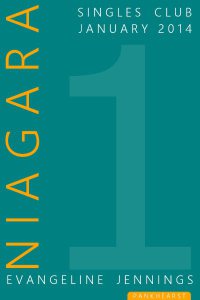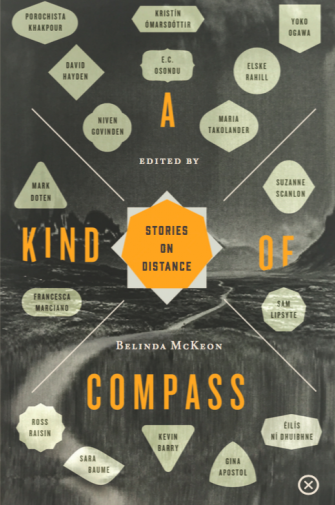Niagara by Evangeline Jennings
-Reviewed by Rebecca Burns-
Niagara by Evangeline Jennings is a short, stand-alone story, around 10,000 words in length and divided into two sections. Jennings launches straight into the story with a description of Ellie, the central character. The portrait is pitted and sharp, immediately conveying Ellie’s unhappy life:
If there was one thing Eleanor hated – and there were plenty – it was her name. Gifted by a father she never knew and lifted from a song by some long dead local legends, Eleanor soon became Ellie, which rhymed with jelly, belly, and smelly. Although she’d never been fat and always kept herself clean that never stopped the bullies at her school. […] Invisible. That’s what Ellie was. Mrs Pot at Number Fourteen and Miss Kettle at Sixteen A both looked straight through her as she passed.
Jennings is persuasive in her depiction of Ellie’s powerlessness. However, the description about the central character is disrupted by the occasional one-word sentence creeping in here and there – ‘Probably’. ‘Invisible’. These single words have the jarring effect of forcing the narrator into the narrative and reminding the reader of the writer outside the text; the descriptive passages would work better without them.
Jennings elsewhere uses brutal, muscular language to good effect. ‘The apprentice thugs at the bus stop didn’t see Ellie either. They were too busy raping a pair of teenage girls with their words, their eyes, and their obvious inclinations.’ This type of direct, pared writing is repeated throughout – for example, the descriptions of the sex-acts between Ellie and her husband are painfully comic and excruciating. We soon learn that sex is used is a weapon to control Ellie – we are told later in the story that her husband, Alec, has raped her. Her son also becomes threatening and touches her inappropriately, prompting her to flee with Karen, her daughter.
Ellie’s lack of choices and opportunities are apparent in her efforts to gather enough money to escape her marriage. She hides her change from shopping trips, steals money from her drug-dealing son’s room, and takes in washing from her cousin. Later, she is paid to post nude for an artist, planting the idea that she can make money from her body.
Jennings portrays Ellie’s husband as using her roughly for his own gratification, with no care for his wife’s pleasure: ‘in bed that night, he fucked her for ten minutes. He was proud of his performance. His stamina, he called it. Ellie wondered if she’d been expected to applaud. Wasn’t her faked orgasm enough?’ Ellie is objectified and exists to meet her husband’s desires. Similarly, she is stripped of validity and meaning when posing for the artist: ”whenever he posed her, she assumed it was his excuse to touch. The back of his hand brushed her breast. Ellie didn’t mind. He was a total stranger and she wasn’t really there.” Here, Ellie detaches from the situation – in other words, her body becomes an object in her own mind just as it does to the artist: ‘the artist’s eyes lingered on her breasts and the tiny tuft of hair between her legs, but he paid twenty pounds an hour for the privilege and gave her extra money for the bus ride home so she considered it a fair trade.’
Jennings is convincing with her representation of Ellie’s degradation and humiliation at the hands of her husband and the artist. However, when the story moves into the second section, her continued sexualisation becomes problematic. After escaping her husband, she manages Shangri-La, a brothel of sorts for couples. Before becoming the manager, she also worked as an escort: ‘she’d lost track and count of all the men she’d satisfied since then, but they all had at least one thing in common. They treated her better than Alec ever had.’ Even after becoming manager, Ellie still uses sex to smooth relations with Gil Rosen (the name is significant), the brothel’s owner. This is where the story becomes difficult for me – although Ellie remembers being treated better by clients than she was at the hands of her husband, and was able to make money, she is still objectified. She doesn’t enjoy the sexual transaction, as revealed in the scene where she gives Rosen oral sex. I would have liked to have seen more internal conflict in Ellie about her life after leaving her husband. Wouldn’t a woman who has been forced to have sex with her husband agonise over becoming an escort?
Jennings offers clues about the way we are supposed to interpret Ellie’s move into the sex industry in her use of Hamlet as a metaphor. In the first part of the story, Karen dissects the play for her homework. Ellie tries to help, telling her: ‘Honestly, though, babe, you can make it mean anything you want, the only thing that matters is being able to argue your case’. Later, Karen writes an essay on the play at University, and the way the reader is supposed to read the women in Niagara is clearly signposted in Karen’s interpretation:
It is very easy – and tempting – to portray them as weak and controlled by their male peers, but if they are perceived as strong characters, it may become apparent that, through manipulation of the men around them, they have far more influence on proceedings than was first assumed.
Extrapolating from this, then, the reader should regard Ellie as empowered through her decision to allow others to use her body. It is an interpretation reinforced through the character of Gil Rosen, the brothel manager. His name is relevant – it is a shortened form of Rosencrantz and Guildenstern, two characters in Hamlet – and it again flags that the story should be interpreted as offering an empowered reading of prostitution.
There are various feminist debates surround prostitution – in very broad strokes, the arguments vary from the radical view that a prostitute did not have a real choice about her work, being impoverished or vulnerable, to the liberal view that prostitution involves autonomy and choice. The liberal view of prostitution offered in Niagara doesn’t work for me. The inner disgust as Ellie services her husband and the artist is palpable, and I would ask what kind of empowerment comes from objectifying a woman’s body? Would Ellie be a prostitute if she had other opportunities? Jennings is so convincing in her portrayal of Ellie’s powerlessness in the early section of the story that I question what choices Ellie really had.






I don’t normally comment on reviews – it seems wrong somehow, an invasion of your space – but I thought your readers might like to know that NIAGARA is free at Amazon until the end of the week.
http://getbook.at/Niagara